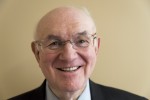Bill Schneider lost track of time during a conversation with David Cameron, the current prime minister of the United Kingdom, in 2005.
Schneider, who has covered every U.S. and British general election in the past 40 years, asked Cameron whether he recalled the 1974 election, ready to discuss the only election in British history that did not produce a majority.
“He looked at me blankly and said, ‘I don’t really remember that. You see, I was 7 years old,'” Schneider said. “It made me feel very antique.”
Schneider, a visiting communication studies professor, said his upbringing in Portsmouth, Virginia, in what he called a turbulent time in history, sparked his interest for politics.
“When I was growing up, politics changed everything,” Schneider said. “I watched an entire social order transform as the civil rights movement came about.”
After Schneider earned a doctorate in political science at Harvard University, he began writing for magazines and newspapers, including the Los Angles Times. Beginning in 2009, he has worked as a public policy professor at George Mason University.
In 1984, Schneider covered the Gary Hart political scandal, which he said was the catalyst for his network career. Schneider added CNN offered him a position in 1990 because he was the most quoted man in America’s political sphere.
At CNN, Schneider analyzed polls and political reports and contributed to the Emmy-winning coverage of the 2008 election. Schneider also earned a Peabody for excellence in media coverage for his work during the 2006 election.
Paul Steinhauser, former CNN deputy political director and Schneider’s colleague, said Schneider could always break down complicated figures into something viewers could understand.
“He could give the numbers behind the numbers and find the story behind the story,” Steinhauser said.
During his time at CNN, Schneider gradually became CNN’s lead political analyst.
“(I thought) the title (was made up) because I had never heard of it before,” he said.
Schneider has said his work allowed him to travel to cover elections in countries like England, France, Germany and Japan. He added he thinks his most noteworthy reporting was his coverage of Margaret Thatcher’s election in 1979.
“It was … like a revolution was happening,” Schneider said. “I had a lot of contacts and friends in both political parties in Britain. For them, after many years of turmoil and disagreement, there was a sense of a new beginning, a sense of real excitement.”
After working with CNN for almost 19 years, Schneider said he was excited to come back to California and teach at UCLA.
“I have a home at UCLA,” Schneider said. “I’ve always been interested in coming out here. … I’ve covered (a lot of) California politics.”
Steinhauser said Schneider’s extensive political knowledge of both coasts is extensive and served the two of them well during a particularly intense campaign season in 2003.
“We were out there for the recall of Jerry Davidson and the re-election of Arnold Schwarzenegger, and Bill was just a walking encyclopedia of California politics,” he said.
Schneider said he hopes to make the presidential election come alive for students enrolled in his Communications Studies 188D: “The 2016 Election: Covering the Primaries” course. He added the class will analyze candidates as their campaigns unfold in the spring quarter and then follow them into the fall.
“We’ll have debates and polls and pandemonium,” Schneider said.
Schneider added he will spend some time in the upcoming fall working in Doha, Qatar, at Al-Jazeera’s world election headquarters.
“On election night, I’m going to be halfway around the world,” Schneider said. “I might have to postpone a class for that.”
Schneider said he isn’t sure how the election will pan out, but he thinks the secret to covering elections lies in the law of the missing imperative, a theory presidential hopefuls use to determine what to bring to an election.
“In every presidential election, voters are looking for something they want, that they are not getting from the incumbent president,” Schneider said. “What is the missing imperative in 2016?”
Jack Censer, former dean of the College of Humanities and Social Sciences at George Mason University, said Schneider’s background made him an invaluable mentor to his students at GMU.
“He’s unbelievably clear minded,” Censer said. “He knows everybody, everything about modern politics and (he’ll) be an enormous success wherever he is.”
Steinhauser said his work with Schneider impacted his own career, even after he left CNN to work for the New Hampshire News Network.
“(Bill) really made me a better reporter, a better journalist,” he said. “I have a better understanding of polls, thanks to my time with (him).”
Schneider said he thinks this election is especially unusual because there isn’t an obvious candidate lined up for President Barack Obama’s seat.
“We’ve had demagogues in the past, but (no one) has even come close to being able to get a major party nomination,” he said.
Schneider said he is looking forward to exploring the race with his students, regardless of what November’s election brings.
“This could be very exciting, and there (will be) a lot of twists and turns,” he said. “But the fun of it is that it’s great to be with a class.”
